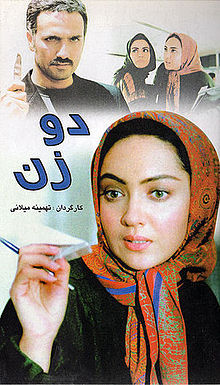- Two Women (1999 film)
-
This article is about the 1999 Persian film. For other uses, see Two Women (disambiguation).
Two Women (Do zan) 
Directed by Tahmineh Milani Produced by Arta film, Arman film Written by Tahmineh Milani Starring Niki Karimi
Mohammad Reza Forutan
Merila Zarei
Atila Pesiani
Reza KhandanMusic by Babak Bayat Release date(s) 1999 Running time 96 min. Language Persian with English subtitles Two Women (Do zan) is a 1999 Iranian motion picture written and directed by Tahmineh Milani.
Two Women charts the lives of two promising architecture students over the course of the first turbulent years of the Islamic Republic, creating a portrait of traditions that conspire to trap women and stop them from realizing their full potential. In an extensive interview, Tahmineh Milani stated that the name Two Women alluded to two different potential life-stories of one woman. The film won the best screenplay award at Iran's Fajr Film Festival in 1999 as well as Best Actress for Niki Karimi's part in the Taormina Film Festival.
Contents
Plot
The film starts at some fourteen years after Fereshteh (Niki Karimi) and Royā (Merilā Zāre'í) became friends, while studying architecture at a university in Tehran. The events in the life of Fereshteh over the course of the preceding fourteen years are revealed through a series of flashbacks that represent Feresheh's and Royā's reminiscences.
Fereshteh, whose family live in reduced circumstances in Esfahan, is an excellent student who brims with hopes and expectations for her future and what she would do for her family on graduating. This fact is accentuated by Fereshteh's declining of a marriage proposal (conveyed by a female intermediary) by a student of mechanics in his last year, studying at the same university, whose father is a university professor; we are further informed that the family of this fellow student are very wealthy. Fereshteh supports herself financially through giving private tuitions to fellow students. Royā's family, on the other hand, are wealthy. She becomes one of Fereshteh's private pupils and through this a deep friendship develops between the two.
Fereshteh is stalked by an obsessive young man, named Hassan (Mohammad-Rezā Foroutan), who stops at nothing for gaining her attention and, as he puts it, marrying her. He stirs up many problems, including inflicting serious bodily harm by throwing acid to Fereshteh's cousin on mistaking him as Fereshteh's boyfriend. This prompts Fereshteh's father (Rezā Khāndān) forcing her to return to their home in Esfahan (although Fereshteh lives independently in a university dormitory, she is formally in the care of her uncle, her father's brother, who lives in Tehran); through some inverted logic, the father believes that the actions of the stalker must have been provoked by some impropriety on the part of his daughter.
These events take place at the time when the universities are being closed by the government of Iran (which in reality took place in the second half of 1979 — see Iranian Cultural Revolution of 1980-1987) so that Fereshteh does not see her departure from Tehran as life-changing, but as a temporary event with no consequence for her studies and her future plans. The stalker follows Fereshteh to Esfahan and during a motorcycle-car chase causes a fatal accident involving two children playing football on street.
A man, named Ahmad (Atila Pesiani), who helps Fereshteh and her family with the legal case ensuing this accident, asks Fereshteh's hand and despite Fereshteh's initial fierce opposition to the proposal, by promising to be supportive of Fereshteh's plan to pursue her studies following the opening of universities, succeeds in gaining Fereshteh's consent and the two marry. After the marriage, he proves to be an utterly jealous husband who bars Fereshteh from having any contact with the outside world that he does not approve of, including association with Royā; although he does not know Royā at all, he feels a visceral hatred towards her, believing that she represents the liberal society that he finds so detestable.
When Fershteh applies to court for divorce, the presiding judge dismisses the case outright, stating that none of the actions of her husband, that suffocate her both emotionally and intellectually, were sufficient for the court to grant divorce. The judge's decision is based on Fereshteh answering a series of questions, such as whether her husband was violent, whether he was unfaithful, whether he had drugs additions, etc., in the negative; in response to Fereshteh's repeated pleas and appeal to her being a human being, the judge retorts not to waste the time of the court. It is remarkable that although one never sees Ahmad beating Fereshteh, in reality he is a violent man, as he constantly verbally abuses Fereshteh and often brandishes a kitchen knife while doing so; this is Milāni's sutbtle way of showing how domestic violence is often not recognized even by its very victims. Fereshteh and her husband have two sons (both in their teens when Fereshteh and Royā meet after fourteen years) who outwardly love both parents equally, but inwardly stand on the side of their mother, who, amongst others, teaches them to the best of her ability.
A chance meeting of Fereshteh, her stalker (still stalking on being released after spending thirteen years in jail) and Fereshteh's husband in the same place proves fateful to the three.
Principal cast and characters
- Niki Karimi - Fereshteh
- Merila Zarei - Roya
- Mohammad Reza Forutan - Hassan
- Reza Khandan - Fereshteh's father
- Atila Pesiani - Ahmad
See also
External links
- Two Women at the Internet Movie Database
- Jasmin Darznik, Free bird: Tahmineh Milani's "Two Women", August 8, 2000, The Iranian.
Cinema of Iran Films A–Z • Chronology of films • Films by year: Pre-1960 • 1960s • 1970s • 1980s • 1990s • 2000s • 2010s
Actors • Directors • Cinematographers • Iranian New Wave • Producers • Score composers • ScreenwritersCategories:- 1999 films
- Iranian films
- Persian-language films
Wikimedia Foundation. 2010.
